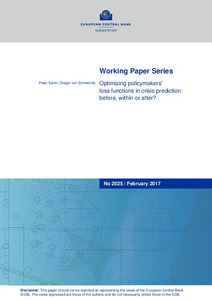Optimizing policymakers' loss functions in crisis prediction: before, within or after?
"Early-warning models most commonly optimize signaling thresholds on crisis probabilities. The ex-post threshold optimization is based upon a loss function accounting for preferences between forecast errors, but comes with two crucial drawbacks: unstable thresholds in recursive estimations and...
| Main Authors: | , |
|---|---|
| Institution: | ETUI-European Trade Union Institute |
| Format: | TEXT |
| Language: | English |
| Published: |
Frankfurt am Main
2017
ECB |
| Subjects: | |
| Online Access: | https://www.labourline.org/KENTIKA-753412457169-optimizing-policymakers-loss-f.htm |
| Summary: | "Early-warning models most commonly optimize signaling thresholds on crisis probabilities. The ex-post threshold optimization is based upon a loss function accounting for preferences between forecast errors, but comes with two crucial drawbacks: unstable thresholds in recursive estimations and an in-sample overfit at the expense of out-of-sample performance. We propose two alternatives for threshold setting: (i) including preferences in the estimation itself and (ii) setting thresholds ex-ante according to preferences only. Given probabilistic model output, it is intuitive that a decision rule is independent of the data or model specification, as thresholds on probabilities represent a willingness to issue a false alarm vis-à-vis missing a crisis. We provide simulated and real-world evidence that this simplification results in stable thresholds and improves out-of-sample performance. Our solution is not restricted to binary-choice models, but directly transferable to the signaling approach and all probabilistic early-warning models." |
|---|---|
| Physical Description: | 29 p. Digital |

